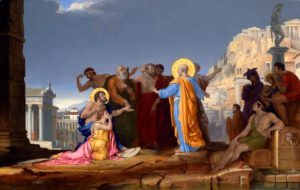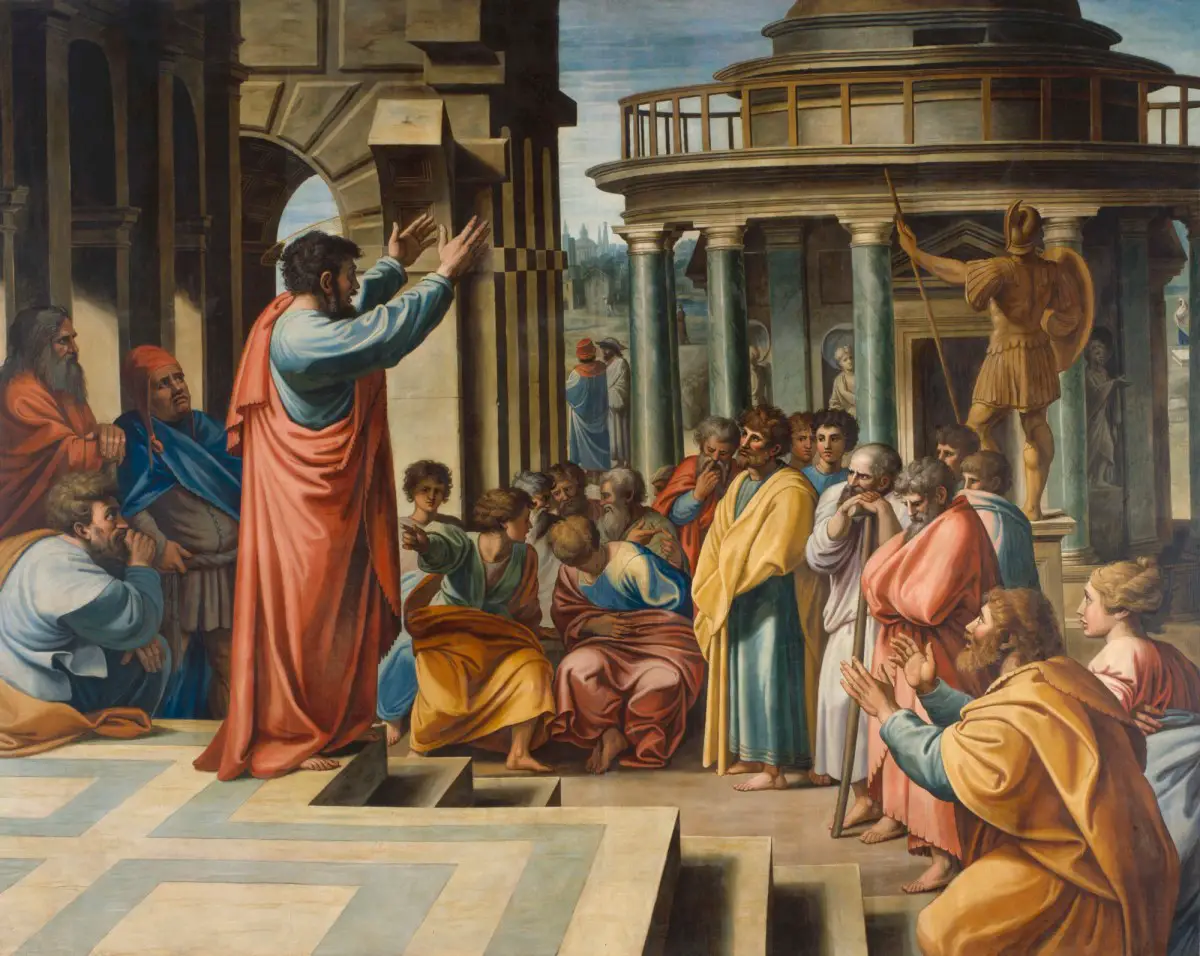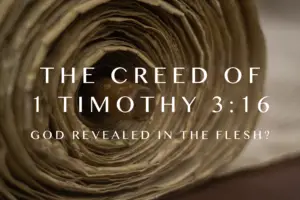If the doctrine of the Trinity and the deity of Christ is the bedrock of the Christian faith, as modern orthodoxy insists, then we should be able to find these foundational teachings in Scripture. In particular, the book of Acts should include such doctrine as it records the spread of the gospel message and the growth of the Church in the first century. This post will examine Paul’s teaching in Athens, as recorded in Luke’s historical account, to determine if the apostle’s theology included Trinitarian beliefs.
Strange Deities
In Acts chapter 17, Paul departed the region of Thessalonica and Berea and traveled by sea to Athens, a city teaming with idols:
Acts 17:16-18 (NASB) Now while Paul was waiting for them at Athens, his spirit was being provoked within him as he was observing the city full of idols. 17 So he was reasoning in the synagogue with the Jews and the God-fearing Gentiles, and in the market place every day with those who happened to be present. 18 And also some of the Epicurean and Stoic philosophers were conversing with him. Some were saying, “What would this idle babbler wish to say?” Others, “He seems to be a proclaimer of strange deities,”—because he was preaching Jesus and the resurrection. (emphasis added)
What did these Gentiles understand the phrase strange deities[1] to mean? Many Biblical scholars view the charge that Paul was a proclaimer of foreign gods, as it is sometimes translated, to be reminiscent of the charge brought against the Athenian philosopher, Socrates, who was accused by Meletus as having a god other than those worshipped in Athens.[2] The government allowed the citizenry to “…bring in by public authority as many gods as they would, but none out of their private opinions…”[3] Who, then, were these private gods Paul seemed to be promoting?
Since the charge against Paul was for promoting strange deities, plural, and not a strange deity, singular, some may assert that the idol worshippers were confused about the Trinity. Perhaps they struggled to understand how three separate persons–Father, Son, and Holy Spirit–constitutes not three gods but one God. Therefore, they charged him with proclaiming more than one deity. If this is the case, confusion would be a reasonable response since today, many struggle to understand this logic-defying doctrine. But a teaching on the Trinity is not mentioned in this passage, nor would it explain how strange deities had something to do with Jesus and the resurrection.
What is more plausible is that they understood Paul to mean that the resurrection was somehow a new god. For example, Ellicott and others explain that the ancient Greeks had the tendency to personify attributes and thoughts. So when a portion of Paul’s audience heard the word resurrection or Anastasis in the Greek, they may have thought the traveling preacher was promoting a new god named, Anastasis, that embodied the concept of immortality.[4] This would certainly be compatible with both Greek culture and the text.
Realistically, however, we may never know for certain what the Athenians thought Paul meant. What is of greater importance, is that we find out what he actually said, and not just how they may have interpreted it. Thankfully, the text provides us with precisely what Paul taught the people of Athens, thus eliminating any question as to his theology.
Paul Preaches Before the Areopagus
Wanting to know more about what this idle babbler was saying, the Athenians brought Paul to the Areopagus (Mars Hill), a summit located northwest of Athens. Here the ruling council, also called the Areopagus, met to consider this Jew’s strange, new teaching:
Acts 17:19-21 (NASB) And they took him and brought him to the Areopagus, saying, “May we know what this new teaching is which you are proclaiming? 20 “For you are bringing some strange things to our ears; so we want to know what these things mean.” 21 (Now all the Athenians and the strangers visiting there used to spend their time in nothing other than telling or hearing something new.)

Paul began to share with the highly religious men of Athens the truth about who God is:
Acts 17:22-29 (NASB) So Paul stood in the midst of the Areopagus and said, “Men of Athens, I observe that you are very religious in all respects. 23 “For while I was passing through and examining the objects of your worship, I also found an altar with this inscription, ‘TO AN UNKNOWN GOD.’ Therefore what you worship in ignorance, this I proclaim to you. 24 “The God who made the world and all things in it, since He is Lord of heaven and earth, does not dwell in temples made with hands; 25 nor is He served by human hands, as though He needed anything, since He Himself gives to all people life and breath and all things; 26 and He made from one man every nation of mankind to live on all the face of the earth, having determined their appointed times and the boundaries of their habitation, 27 that they would seek God, if perhaps they might grope for Him and find Him, though He is not far from each one of us; 28 for in Him we live and move and exist, as even some of your own poets have said, ‘For we also are His children.’ 29 “Being then the children of God, we ought not to think that the Divine Nature is like gold or silver or stone, an image formed by the art and thought of man.
Paul’s God is the Creator
Paul plainly states that the God he is proclaiming is the Creator of all, the one who gives life, breath, and all things to all people. What’s more, Paul says this God desires that all men would seek Him. More specifically, God the Creator wanted the Athenians to know who He is.
When we look at Paul’s message and the language he uses, we see that God the Creator is one person, not a triad of persons, as evidenced by his usage of singular personal pronouns–ten times in this brief passage–to describe God.[5] This singular Creator God is, according to the Jews, the Father.
Isaiah 64:8 (NASB) But now, O LORD, You are our Father, we are the clay, and You our potter; and all of us are the work of Your hand. (emphasis added)
When Peter, John, and other Jewish believers prayed, they addressed their prayer to God, “who made the heaven, the earth and the sea, and all that is in them
Acts 4:23-24 and 27-28 (NASB) When they had been released, they went to their own companions and reported all that the chief priests and the elders had said to them. 24 And when they heard this, they lifted their voices to God with one accord and said, “O Lord, it is You who have made the heaven and the earth and the sea, and all that is in them…27 “For truly in this city there were gathered together against Your holy servant Jesus, whom You anointed, both Herod and Pontius Pilate, along with the Gentiles and the peoples of Israel, 28 to do whatever Your hand and Your purpose predestined to occur. (emphasis added)
It is important to note that they differentiated between God, who is the Creator, and His servant, Jesus. More specifically, they did not ascribe credit to Jesus for any portion of Creation. Paul, affirmed these truths in his epistles. For example, in his letter to the church in Ephesus, he wrote:
Ephesians 3:9-11 (NASB) and to bring to light what is the administration of the mystery which for ages has been hidden in God who created all things; 10 so that the manifold wisdom of God might now be made known through the church to the rulers and the authorities in the heavenly places. 11 This was in accordance with the eternal purpose which He carried out in Christ Jesus our Lord (emphasis added)
Thus, when Paul tells the Gentiles in Athens that God is the Creator and that this Creator is a singular “He,” it is in keeping with Jewish thought, Biblical teaching, and his own beliefs.
Paul continues by explaining to the Areopagus that God, again using singular personal pronouns, is calling for all people everywhere to repent because the day of judgment is coming:
Acts 17:30-34 (NASB) “Therefore having overlooked the times of ignorance, God is now declaring to men that all people everywhere should repent, 31 because He has fixed a day in which He will judge the world in righteousness through a Man whom He has appointed, having furnished proof to all men by raising Him from the dead.” 32 Now when they heard of the resurrection of the dead, some began to sneer, but others said, “We shall hear you again concerning this.” 33 So Paul went out of their midst. 34 But some men joined him and believed, among whom also were Dionysius the Areopagite and a woman named Damaris and others with them. (emphasis added)

Jesus is a Man
Note that Paul said God has fixed a day in which He, singular personal pronoun, will judge the world. How is the one God going to execute judgment on sinful man? Paul tells us plainly that God is going to judge the world through a man whom He has appointed. Not through a God-man or the second person of the Trinity, but through a man. What’s more, this man is not inherently the judge of all men but has been appointed to this position by God. How do we know this is true? How do we know that God delegated His authority to a man that he might judge all other men on God’s behalf? According to Paul, God proved it to be true when He raised Jesus from the dead. Some Trinitarians believe that Jesus’ resurrection was proof that he was God. But Paul says it was to validate the claim that Jesus is God’s appointed judge.
That the Messiah would serve as God’s appointed judge was prophesied in Scripture:
Isaiah 11:1-5 (NASB) Then a shoot will spring from the stem of Jesse, And a branch from his roots will bear fruit. 2 The Spirit of the LORD will rest on Him, The spirit of wisdom and understanding, The spirit of counsel and strength, The spirit of knowledge and the fear of the LORD. 3 And He will delight in the fear of the LORD, And He will not judge by what His eyes see, Nor make a decision by what His ears hear; 4 But with righteousness He will judge the poor, And decide with fairness for the afflicted of the earth; And He will strike the earth with the rod of His mouth, And with the breath of His lips He will slay the wicked. 5 Also righteousness will be the belt about His loins, And faithfulness the belt about His waist. (emphasis added)
The human descendant of Jesse, the Messiah, would be anointed with the Spirit of God to judge the world in righteousness. Jesus affirmed this authority was given to him by God the Father:
John 5:21-22, 26-30 (NASB) “For just as the Father raises the dead and gives them life, even so the Son also gives life to whom He wishes. 22 “For not even the Father judges anyone, but He has given all judgment to the Son…26 “For just as the Father has life in Himself, even so He gave to the Son also to have life in Himself; 27 and He gave Him authority to execute judgment, because He is the Son of Man. 28 “Do not marvel at this; for an hour is coming, in which all who are in the tombs will hear His voice, 29 and will come forth; those who did the good deeds to a resurrection of life, those who committed the evil deeds to a resurrection of judgment. 30 “I can do nothing on My own initiative. As I hear, I judge; and My judgment is just, because I do not seek My own will, but the will of Him who sent Me. (emphasis added)
This truth is also reflected in Peter’s sermon to Gentiles in Caesarea:
Acts 10:42-43 (NASB) “And He ordered us to preach to the people, and solemnly to testify that this is the One who has been appointed by God as Judge of the living and the dead. 43 “Of Him all the prophets bear witness that through His name everyone who believes in Him receives forgiveness of sins.” (emphasis added)
In other words, Paul’s theology in Athens is in keeping with Scripture, which, along with the resurrection, proves that Jesus is the human Messiah, appointed by God to judge the world, not that Jesus is himself, God as the Hellenized Church Fathers would later theorize.
Just as God desired for the men of Athens to come to know the unknown God, today, He wants us to come to know Him for who He truly is, the God and Creator who gives life and breath to all men, including Jesus.
[1] The word deities is daimoniōn in the Greek, and it means evil spirits or demons. Sixty-two out of the sixty-three times this word appears in the New Testament, it is translated as such, except for here in Acts 17:18 where translators have rendered it as deities.
[2] For example, Gill’s Exposition of the Bible, https://biblehub.com/commentaries/gill/acts/17.htm
[3] Acts 17:18, Matthew Poole’s Commentary, https://biblehub.com/commentaries/poole/acts/17.htm
[4] For example, Acts 17:18, Ellicott’s Commentary for English Readers, https://biblehub.com/commentaries/ellicott/acts/17.htm
[5] I did not include the singular personal pronoun used in the quote Paul referenced.




